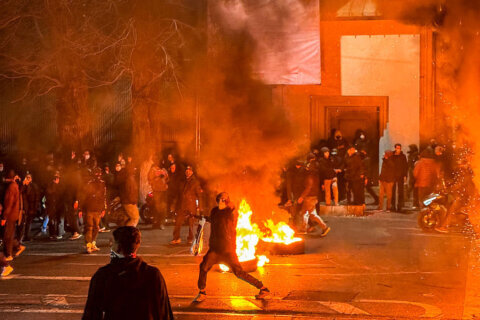WASHINGTON — Stung by withering criticism for not preventing Belgium-based terrorists from attacking Paris in 2015 and Brussels in March, Belgium’s ambassador to the U.S. refused to respond to “cheap clichés and stereotypes,” strongly countering allegations that Belgian intelligence missed or overlooked key intelligence about the attackers.
“After the fact, it’s rather easy to say [for example] in March last year there was a cable coming from this office or that office telling you about this person,” Johan Verbeke told WTOP in an exclusive interview.
But he said critics are missing the “fact that [cable] was one among thousands that entered the intelligence community.”
Declining to join what he called “a game of denial of critical points mentioned by the press,” Verbeke admitted that “there have been weak spots.” But he said allegations that Belgian intelligence and law enforcement failures allowed the Paris and Brussels attackers to launch attacks “is a bridge too far.”
“I concede that not everything is perfect, but I can tell you that things were working much better than the press and others have been showing,” Verbeke said.
He added that critics have overlooked Belgium’s counterterrorism achievements.
Going back to 2012, Verbeke said, the country was already aware of a cell of ISIL-linked terrorists.
“Proof of that is that since 2012 up to the beginning of this year, no less than 150 court trials took place in Belgium related to terrorism and no less than 86 people were convicted are incarcerated,” he said.
Additionally, Belgium broke up a large scale terror cell in January 2015, stopping what might have been another disastrous attack on the region.
“We were successful in dismantling a network in a city close to Liège called Verviers,” Verbeke said. “That network was close to launching an attack against one or more police stations — not just small stations. This was a big operation and we dismantled the network days before the attack was planned.”
Several key operatives were arrested.
A U.S. intelligence bulletin obtained by WTOP in early 2015 said the “DHS Office of Intelligence and Analysis assesses that the plot disrupted by Belgian authorities in January 2015 is the first instance in which a large group of terrorists possibly operating under ISIL direction has been discovered and may indicate the group has developed the capability to launch more complex operations in the West.”
But even that success was turned against Belgium by some critics.
More than a dozen people were arrested on Jan. 16, 2015. At least eight were reportedly from Molenbeek, which turned out to be a hub of operations for both the Paris and Belgium attackers.
Belgian intelligence personnel have been criticized for not recognizing the links between those in custody and those who launched attacks later.
Verbeke defended the intelligence services, saying, “Every day, these people receive hundreds of indications about what could possibly happen and who could be involved, and it’s very difficult to sift through those hundreds of information pieces to find the relevant ones.”
Belgium’s international colleagues, including the U.S., have come to their defense.
“The official leaders of [the U.S.] do not share this criticism of our intelligence and security. Many have said what you’re going through is what we went through after 9/11,” Verbeke said.
Rob Wainwright, director of Europol, told WTOP, “The Belgium investigators were rather overwhelmed by just how much activity was going on and how much information was available, and it was just a seismic security event, of course, in Europe last November.”
As far as allegations that Belgian and French authorities were not working together, Wainwright said, “I think there’s been some unfair media hype around the nature of the cooperation between Belgium and France. As far as I can see it’s very close.”
Critics often overlook a key component of Belgium’s counterterrorism struggle: the complex nature of the region, and Belgium in particular.
“Belgium is a country with the windows and the doors wide open, because that is how we live and how we survive. It’s a lifestyle question,” Verbeke said.
With three official languages — German, French and Dutch — Belgium is a magnet for people from all over the world, he said. Belgium thrives on Europe’s open-border policy to support its economy, which derives 85 percent of its gross domestic product from exports.
Unfortunately, terrorists have taken advantage of that open society to launch deadly attacks, which predated the attack at Belgium’s Jewish Museum in May 2014.
Verbeke said it’s important to understand Belgium’s dedication to privacy for citizens, and the need to balance that with the need for security.
However, in the wake of the attacks, changes to long-standing privacy policies are under scrutiny.








